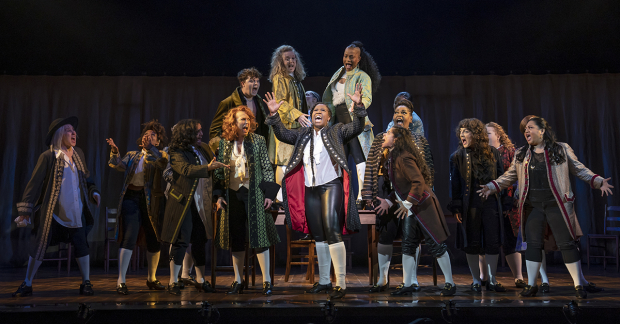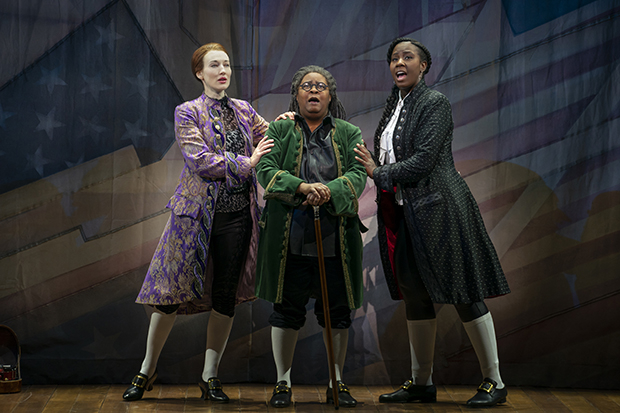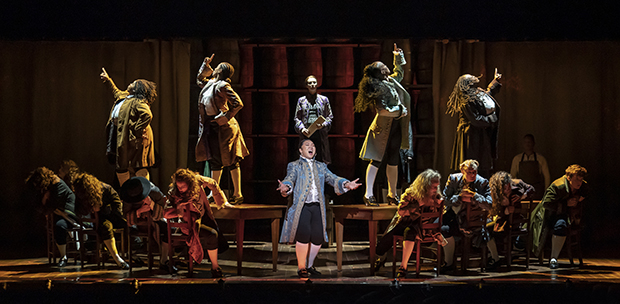Review: 1776 Returns to Broadway in a Terminally Woke Revival That Misses the Point

(© Joan Marcus)
Progress isn't casting Sherman Edwards and Peter Stone's Tony-winning musical 1776 with a BIPOC or gender-expansive company. It's casting 1776 with people who don't look like the Founding Fathers and not drawing attention to it. In that regard, Jeffrey L. Page and Diane Paulus's Roundabout Theatre Company revival at the American Airlines Theatre takes a door left ajar by Hamilton and runs right through it, as they should. But this new Broadway mounting (which originated last summer at American Repertory Theatre and will embark on a national tour next spring) wants to have it both ways — they're simultaneously hoping we notice how progressive it's trying to be, but also not really, while emphasizing the wrong things along the way. The result, while enjoyable, shows a fundamental lack of trust and understanding in material that they would see already does the work for them, if they just stopped to listen.
As a musical, 1776 is indestructible, with a smart, funny, and deceptively simple score (Edwards), and an ironclad script (Stone) that manages to do the impossible: It creates edge-of-your-seat suspense in the story of whether the Founding Fathers will sign the Declaration of Independence. It's also — despite the outward appearance of its almost all-white, almost all-male character list — daringly progressive for its day, condemning the existence of slavery and giving the revolutionary leaders the foresight to realize that they're not infallible. When the original Broadway company was invited to perform at the Nixon White House, the administration asked they cut two numbers, including the Republican minuet "Cool, Cool Considerate Men." Producers vehemently declined. That's the kind of show this is. (Although the event went on anyway and Nixon jumped to his feet, it's said that he eventually convinced film producer Jack Warner to cut the number from the movie.)
What's already there on paper isn't good enough for directors Page, who also provides needlessly expressionistic choreography, and Paulus, who seem to think that 1776 is tantamount to MAGA-style propaganda. They do their best to infuse the musical, which hardly needs to prove its political bona fides, with the kind of liberal zealotry that makes your Fox News-watching uncle seethe. The eye-rolling sanctimoniousness, the knowing glares of complicity at us…the whole thing is "woke" to a fault, while really having nothing to say beyond "Look, we've cast this show with people who have been historically marginalized." That's nothing new, though — different directors have been doing that for years in various ways, including all-female-identifying companies. Not only have Page and Paulus given themselves an uphill battle against a text that is already on their side, it doesn't even seem like they like this show.
The result feels like an MFA thesis better suited for a university black box, and not just because of the barebones design (Scott Pask's uncharacteristically cheap set is little more than a couple of sliding curtains and some old-timey tables and chairs, while Emilio Sosa's costumes are your typical stock Revolutionary War-wear), or the fact that the actors get into costume on stage while staring us down. The sound designer Jonathan Deans blasts the hell out of our eardrums, often making the lyrics all but incomprehensible, and semi-distorting the inventive new rock orchestrations by John Clancy.

(© Joan Marcus)
The actors too are all over the place — some great, some bland, some distressingly amateur. At the center is a duo of ineffectual performances from Crystal Lucas-Perry (John Adams) and Patrena Murray (Benjamin Franklin), who fade too far into the background when they're supposed to be carrying the show. That Lucas-Perry leaves the cast two weeks after opening night to star in a different Broadway show sort of tells you all you need to know, and I'd be curious to see if her successor, Kristolyn Lloyd, has the presence the role really needs to pull this "obnoxious and disliked" character off successfully.
You know there's a problem when you leave a 1776 thinking about how incredible the Martha Jefferson is, and Erin LeCroy almost steals the entire show with Martha's paean to her husband Thomas's sexual voracity, "He Plays the Violin" (it is forever a weird number, and it is exceedingly well performed). Carolee Carmello is delightfully smug as the unctuous John Dickinson, one of the "cool, cool, conservative men" (never to the left, forever to the right) who oppose independence. I'd love to see her as an Adams in not just a concert setting.
Also on the right, Sara Porkalob sinks her teeth into Edward Rutledge's dark and twisted "Molasses to Rum," though her perfectly scary rendition is mortally undercut by Page's baffling choreography: He has several Black ensemble members do an interpretive dance that suggests a slave auction. I cannot imagine what that's like to perform every night, nor can I imagine what it's like for them when that number receives one of the biggest hands of the evening. I don't think the directors wanted to make the audience cheer with such vociferousness at this ode to America's original sin, but they do.
Davis, who brings a stately and imperious feeling to her Jefferson, being visibly pregnant in real life is one of the true examples of progress on that stage, and that's the kind of inclusiveness this production should be praised for. Ditto its diversity in body type, which is rarely considered in an industry where everyone is expected to be jacked. While they lose points for not casting any elderly people (it is a mostly very young company), these are the elements that are truly revolutionary, which is more than I can say for the rest of this over-amplified, terminally woke revival that doesn't really have anything to say.

(© Joan Marcus)











